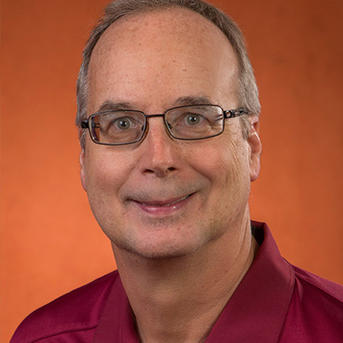Sustainable Healthy Cities Network
Date: 2/19/2019
Author: Cassie Oswood, Public Relations
Dr. Richard Feiock is the Augustus B. Turnbull Professor & The Jerry Collins Eminent Scholar Chair at The Florida State University Askew School of Public Administration and Policy as well as a current editor for the Public Administration Review. Dr. Feiock is known for his work on the subjects of local government, intergovernmental management, environmental policy, and administrative affairs.
On February 12, 2019 Dr. Feiock visited Texas A&M University to give a presentation on his research of the “Sustainable Healthy Cities Network for Integrated Urban Infrastructure Solutions” to the IfSC. This research project works to look at urban infrastructure systems individually and as a network. Some of the systems under analysis include buildings and energy, food, green infrastructure, transportation, water, and waste. The planned societal outcomes of the research are better overall wellbeing, health, equity and livability. For an urban area to achieve a ‘smart and sustainable’ design, equity planning needs to be first. There needs to be focus on engaging the communities and what it will look like to put equity as a primary initiative in future planning processes. Partners to the research project agree, “equity is the missing element.” The results of this research project will be used to foster change through technology and design innovations, spatial reconfiguration, policy and governance.
Urban infrastructure was chosen as the focus for the research because the contributions from urban areas dominate global greenhouse gas emissions, when accounting for fuel and electricity imports to the cities, and food-system relations impacts such as consumption-production links. The research looks at the interactions between urban contributions to greenhouse gases in terms of sustainability and livability. To focus on the livability aspect, the research team created a 3-part workshop on livability. The 3 parts are:
1. Conceptualizing and defining the terms of research framework
2. Reflections on what to measure and how
3. Identifying partnerships for measuring equity
Following the livability workshop, the research team scheduled phone calls to discuss partnership opportunities with urban areas such as Fort Collins, Baltimore, Atlanta, Austin, Urbana, and New York City. The research team plans to expand the research to new partner cities for sector-specific baseline assessments and infrastructure and wellbeing baseline assessments.
The team also created the ‘My Neighborhood, My Life Survey’. The survey acts as an analysis of livability in an urban area on the individual level. The survey is broken into 5 parts. The parts identify what neighborhood the participant lives in and their level of wellbeing, how important they think different services or amenities are in shaping their wellbeing and general information such as household size and income range.
To achieve multiple sustainable outcomes, seven provisioning sectors were outlined by the research team for analysis.
1. Energy supply
2. Buildings
3. Transportation and connectivity
4. Food supply
5. Water Supply
6. Sanitation and waste
7. Public spaces
After analyzing all of the planned outcomes from the research, societal, infrastructure, natural systems, environmental, health, and livability, it was determined that inequality and inequity are measured across the spectrum of all of the parameters.
To assess trade-offs and co-benefits among the different societal outcomes the research uses a transboundary system view of economy and trade data inside and outside the city. The assessment looks at the economic activity and system wide water, energy, and greenhouse gas footprint, which is ultimately related to the Food-Energy-Water Nexus demand in the cities.
The research and assessments that Dr. Feiock and his team are conducting are both informative and essential for the futures of cities. The results of their research have already been featured in magazines such as Science. The IfSC looks forward to following the research and the societal and governance outcomes that result from it.
